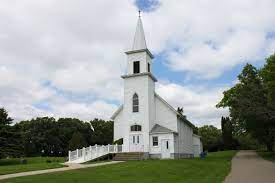Is this the future of small rural church cemeteries?

A typical small Lutheran heritage church and cemetery in my area
If you don’t live in “flyover land” like I do, you are probably not even aware of the small rural churches that have been closed. Churches built by the pioneer throngs when they settled in rural America seem to have have run their course as it is now easier for rural families to commute to larger churches in nearby cities.
However, not many of those closed rural churches, like the one featured in this story, have an AR-15 in the church closet to keep order at church or cemetery meetings.
The economics of these small churches is such that it is difficult to maintain operations including even a part-time pastor with the limited number of parishioners. And, even pastors cannot afford to work part-time anymore and the shortage of them in the work-place makes it almost a necessity for them to be employed by larger city and small town churches rather than the small rural churches.
What many of these small churches do have, however, is a cemetery – operated and maintained for upwards of 150 years by the pioneer settlers and their families. And, with that cemetery sometimes comes a savings account for maintenance provided over the years by the benevolence and philanthropy of those founding members. Those savings accounts can at times be large. . . and sometimes large enough to cause a disagreement about who owns the funds.
One such story comes from this recent article about the Singsaas Church and the Singsaas Church Cemetery Association located in rural South Dakota. According to the article a dispute consists of parties where, “On one side of the dispute stands a growing nondenominational congregation led by an outspoken, divisive pastor who brought the old church back from the brink of closure and is eager to take a stand in the culture wars.”
And on the other side, “. . .are many descendants of old families who worshiped in and sustained the quiet rural Lutheran church for generations, and who see the new pastor and congregation as a threat to their heritage.”
Turns out that the new church group held a congregational meeting on June 12 at the church and elected an entirely new board of the cemetery association. . . .and allegedly hired armed guards to control the attendance. So, now it appears that there are two boards — one representing the new church and one representing the historic cemetery association.
Litigation is preceding and who ever prevails will apparently control the finances of the Singsaas Cemetery Association.
According to the article, lawyer Eric Rasmussen, representing those contending against the new church-supported board commented, “The lawsuit has been pending for more than a year; we have been hoping that an agreed settlement of the issues could be reached. Unfortunately, that has not happened, and it now appears that the court will have to settle the matter.”
Funeral Director Daily take: If you live where I live these small, predominantly Lutheran churches, dot the rural countryside as the building was once the fabric of the community in the horse and buggy days — days when travel to the church needed to be short because of that horse and buggy mode. The churches were not only the faith center but the social center for these new Scandinavian American immigrants.
Today, as many small farms have morphed into less, but larger corporate farms, the churches don’t serve as those faith and social centers anymore. . . .It’s just too convenient to join a larger church even if it is a few miles drive away.
However, the cemeteries historically maintained by families in the area many times have large perpetual care funds that may not be properly bequeathed to the cemetery and sometimes reside in church general coffers. In many cases, it is those funds that seem the target of new leaders either purchasing or renting these churches.
Unfortunately, I think as we move forward we will see more of these disagreements.
More news from the world of Death Care:
- Oliverie Funeral Home provides 2nd location for Life Celebration. Jersey Shore Online (NJ)
- Youpla funeral fund collapse leaves 31 Aboriginal families struggling to pay for burials. The Guardian (Australia)
- Police pursuing six cases against Abilene funeral director, additional victims sought. Abilene Reporter News (TX)
- In life my sister taught me how to love. In death she made me want to fix the funeral industry. The Guardian (Australia)
Enter your e-mail below to join the 2,762 others who receive Funeral Director Daily articles daily:





















@Donald E Wilson the globalist buying out all our cementaries and neglecting is worse.
I can say, as a decendant of the founding people of this church and the nearby town, that this the actual case of this particular church. My grand parents, great grandparents, my mom and My eldest daughter. The people who got kicked out (also decendents and life long members), are actually responsible for doing a lot of restoring and bring the cemetery back to a better state. The town closest where we originally settled is a town of 800 people. Alot of money was put in the “Singsaas cemetery fund” specifically to maintain the old and new Graves etc. The pastor has no need for it as he is only in charge of the church it’s self. There’s so much more to this story though.
I doubt most rural church cemeteries have “large” perpetual care funds/maintenance trusts as the writer says. My experience is that they have little or nothing set aside and as we have all seen, when the church disbands or moves, the cemetery remains and is often neglected. It doesn’t help matters that church cemeteries are seen by the congregation as a benefit of church membership and no income is derived from it and it becomes a burden (similar to many municipal cemeteries). All that being said, who will maintain the cemetery into perpetuity?